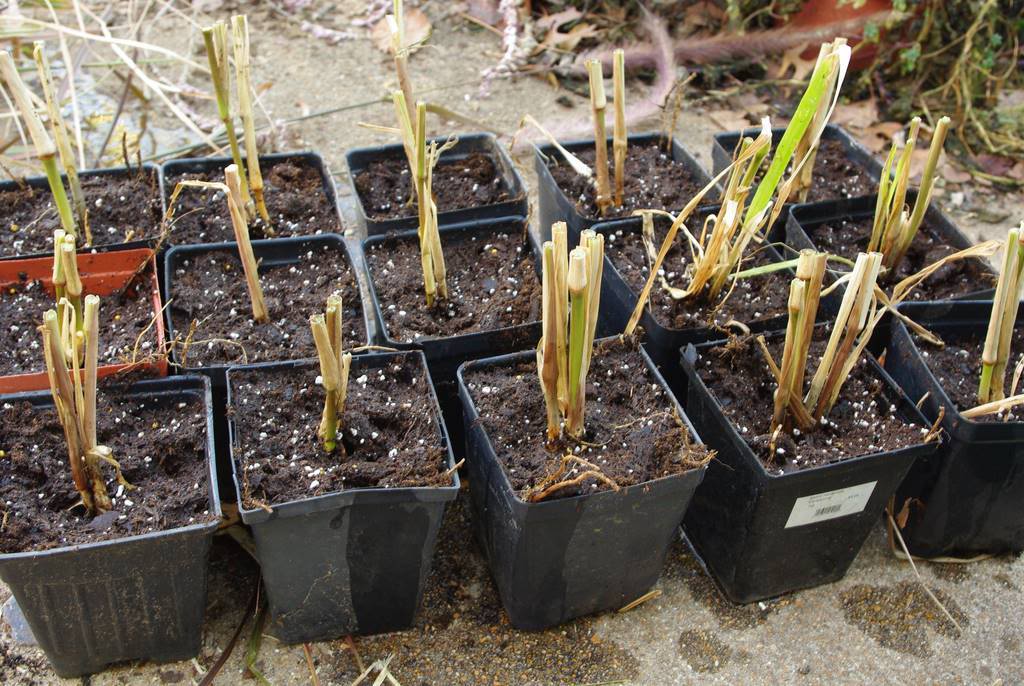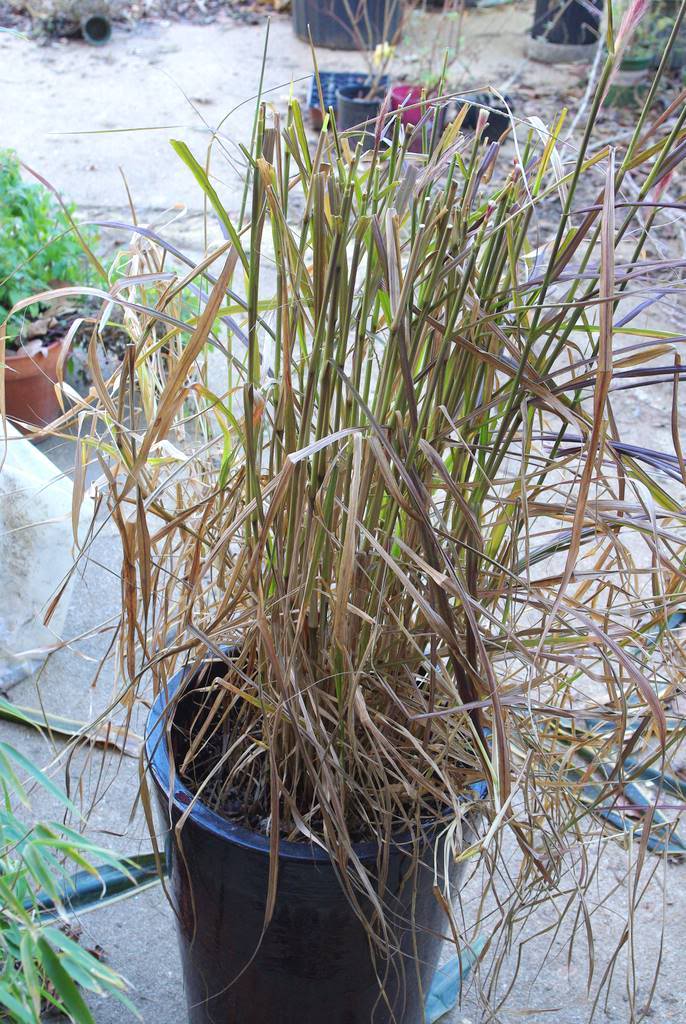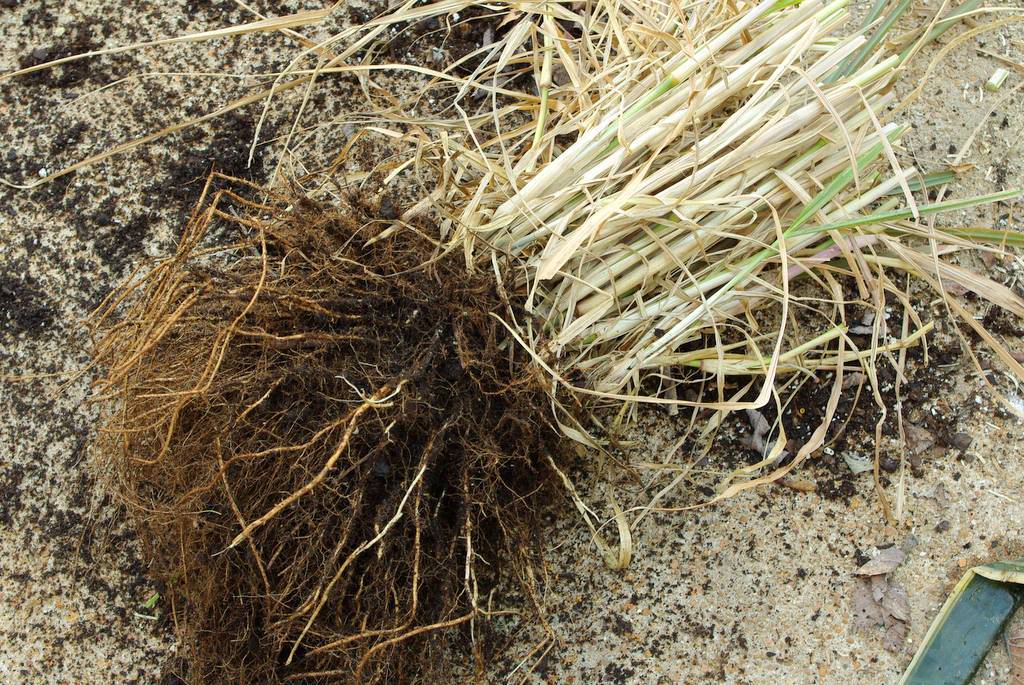Actually, since we had our first hard freeze a few weeks ago, the purple fountain grass that was planted in the ground has all died. I always grow at least one of these in a pot each year though, and I pull it into the garage when the cold weather is imminent. This lets me work on the salvage project when I have time instead of rushing to get it done before the freeze.
It looks pretty ratty -- is it still alive?
Yes it is, as there are signs of growth:
The first step is to pull it out of its pot:
Even though this pot is approximately 24 inches (61cm) tall, it's not deep enough for grasses -- they have deep roots -- and it gets quite root-bound.
After chopping off the roots, shaking off the extra potting mix, and cutting the top growth down a bit more I have something that I can work with:
This clump isn't too large, so I just grabbed half with each hand and pulled as hard as I could:
I needed to cut the roots a little with my pruners to help loosen the intertwined roots, but I got it pulled in two. Then it was just a matter of pulling smaller sections out. These stalks are loosely connected, so it's not difficult to pull small sections out.
I start with pretty small clumps now -- only a single stalk is needed to produce a new plant over the winter months, but I usually use two or three. Sometimes only one though.
These sweater boxes are perfect for holding 15 quart-sized pots (also called 4" pots I believe):
 |
| You couldn't find just one more black pot? |
I filled each up halfway with fresh potting mix and some slow-release fertilizer (Milorganite):
I was going to reuse the older mix I salvaged from this and other pots, but since these plants will be in the house for a few months I want to reduce the chance of bringing in fungus gnat eggs and other undesirable critters. So I went with fresh mix.
Then it's just a matter of jamming each plant into its pot, trimming roots where needed (some are quite long), and filling with more soil. Planting depth isn't too critical I've found, but I usually plant a little deeper than it seems like I should to allow for settling of the soil. I can always pull these up a little bit if they seem too deep once all of the soil is in -- they're grasses, so they can take it.
Now it's just water and wait for those first signs of growth. Although I do this every year, I'm always nervous until I see some fresh blades emerging.
 |
| Initial watering was out of the sweater box so I could let them drain. |
Last year I salvaged 10 of these plants -- which was the most I had ever overwintered. This year I've got 15. I wonder how many I'll save next year? I'm guessing it will be a multiple of 15 since that's how many fit in the sweater box.
I'll definitely have plenty to plant anywhere I want -- even though I've got some new planting beds next to the driveway and pond -- and probably extras to give to neighbors.
If you live in a colder climate, grow this grass, and buy it every spring, why not try overwintering it? It's quite simple and will save you lots of money during plant-buying season.
.










Excellent system! Who would have thought that a sweater box could be so handy for anything other than--well--sweaters. I have a mishmash of pots with cold sensitive plants sitting in front of the big window in the upstairs loft and each one has a separate drip pan (left-over plastic containers). Having all of these plants in one large box would make watering and moving them around much easier. I will get myself a sweater box!
ReplyDeleteGerhard: find one with as flat a bottom as possible, and square sides. I got these a few years ago, and the newer models are more rounded and therefore less useful.
ReplyDeleteAlan, yeah, what's up with that? Why does everything have to be rounded? Nothing against curvy, but some things need to have proper right angles!
ReplyDeleteNice! I actually found a variety of purple Pennisetum that's supposedly hardy in my zone (8), but I'm still doubtful about it. Perhaps I'll pry up a small wedge and try to overwinter it indoors...just in case :-)
ReplyDelete